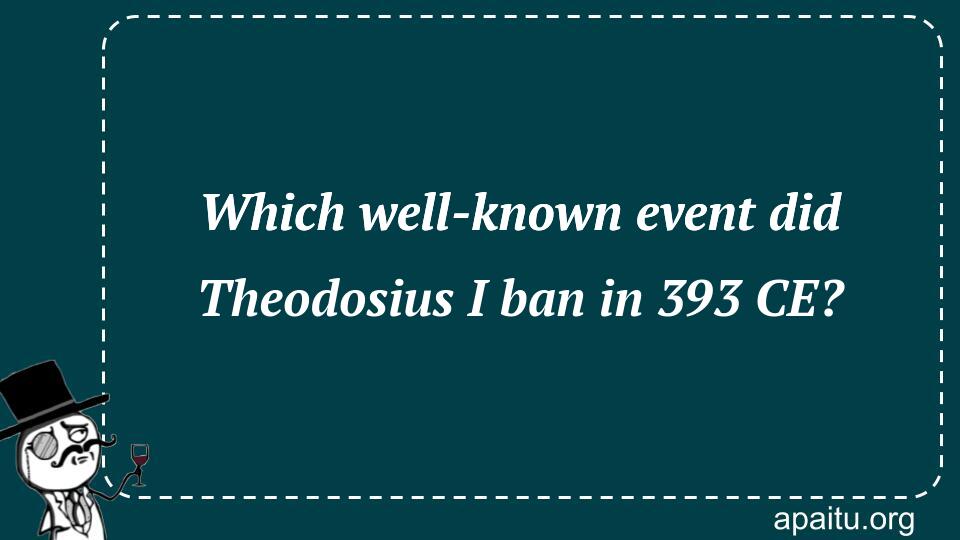Question
Here is the question : WHICH WELL-KNOWN EVENT DID THEODOSIUS I BAN IN 393 CE?
Option
Here is the option for the question :
- Easter
- The Olympics
- Christmas
- Gladiator games
The Answer:
And, the answer for the the question is :
Explanation:
Theodosius I, in an effort to promote Christianity, put an end to the Olympics in 393 CE after concluding that they were indistinguishable from pagan rituals. After an absence of 1,500 years, the Olympic Games were revived in Athens in 1896.

In 393 CE, Theodosius I, the Roman emperor from 379 to 395 CE, issued a decree that banned the Olympics, marking the end of an era for the ancient sporting event. Born on January 11, 347 CE, Theodosius I was a Christian emperor who sought to establish Christianity as the state religion and suppress pagan practices. The ban on the Olympics was part of his broader campaign to eradicate pagan rituals and festivities, and to promote the growing influence of Christianity within the Roman Empire.
The Olympics, held in Olympia, Greece, had a long and storied history dating back to ancient times. The games were dedicated to the Greek gods, particularly Zeus, and were seen as an expression of religious devotion and athletic competition. For centuries, the Olympics had served as a symbol of Greek unity and cultural identity, attracting participants and spectators from across the Mediterranean.
The decision to ban the Olympics was influenced by a combination of religious and political factors. Theodosius I, a devout Christian, believed that the Olympic games were rooted in pagan worship and idolatry. He saw them as incompatible with the growing influence of Christianity and sought to eliminate any practices that contradicted the teachings of the new state religion.
Furthermore, Theodosius I was concerned about the political implications of the Olympics. The games brought together people from various city-states and regions, providing an opportunity for political alliances and rivalries to form. Theodosius I aimed to centralize power and maintain a strong, centralized Roman Empire. Banning the Olympics helped curtail the potential for regional loyalties to develop and ensured that the empire remained firmly under imperial control.
The ban on the Olympics had far-reaching consequences. It marked the end of an era of athletic competition and cultural exchange that had lasted for over a thousand years. The games had served as a platform for athletes to showcase their skills, fostered a sense of camaraderie among participants, and promoted cultural exchange among the diverse communities of the ancient world.
Theodosius’s decree had immediate and lasting effects on the Olympic tradition. The games were abruptly halted, and the once-thriving Olympic Stadium fell into disrepair. The ban, coupled with the decline of the Roman Empire, led to the gradual erasure of the Olympics from public memory. The ancient site of Olympia, which had once been a bustling center of athletic and religious activity, became a relic of the past.
However, it is important to note that Theodosius’s ban did not completely extinguish the Olympic spirit. The games were eventually revived centuries later, in 1896, with the establishment of the modern Olympic Games. The modern Olympics draw inspiration from the ancient tradition while embracing the values of international cooperation, sportsmanship, and cultural exchange.
The ban on the Olympics under Theodosius I reflects t